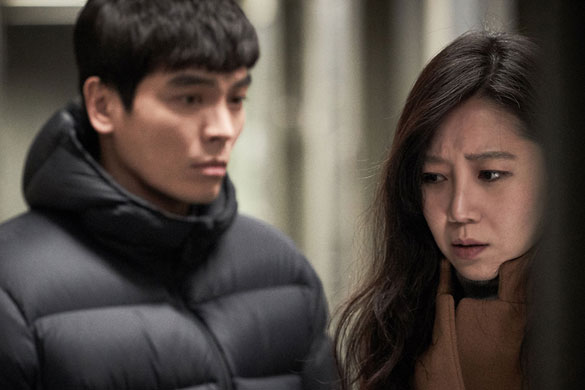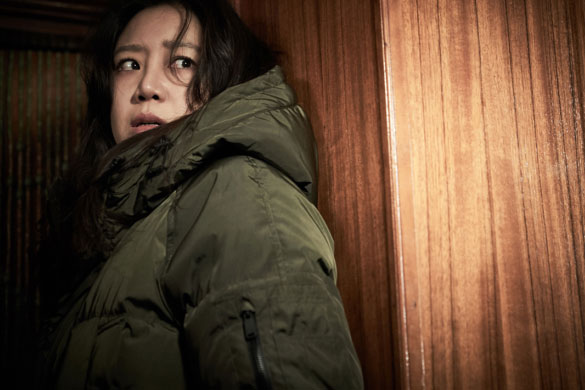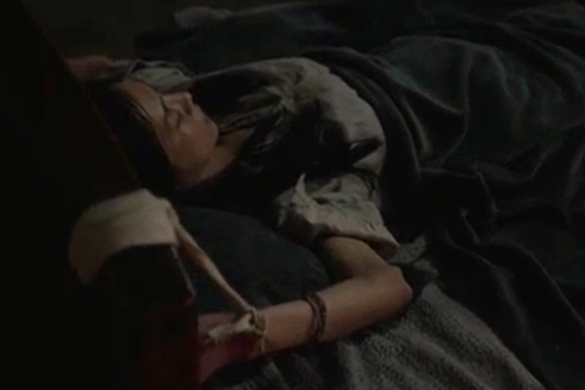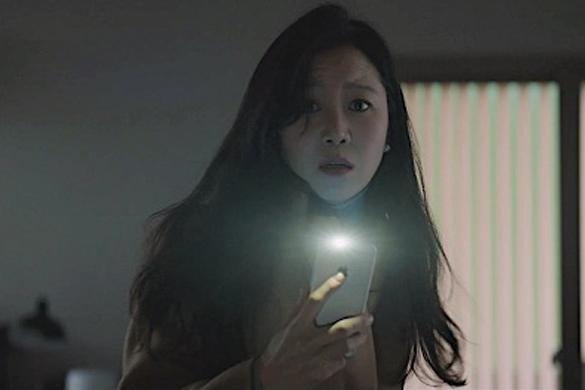"You're not cold, are you? Many people are looking for you. Your sister often sends you SMS messages...
But who is Hyo-joo? Is she a close friend? She's been messaging you continuously today...
I have to tell you, I've already found someone else. I want you to know that I feel really guilty, Seung-hye.
Maybe you know the girl I've chosen to replace you, she lives in the apartment below yours..."
Synopsis:
Kyung-min (Gong Hyo-jin) lives in a high-rise, security protected apartment block in Seoul, working as a bank teller on a temporary contract. Somewhat unsettled on finding the cover to her door entry keypad in a different position than she always makes a point of leaving it, she nonetheless puts the incident down to her mother moving it out of place on visiting. Kyung-min changes the entry code, to be on the safe side, and carries on with her day.
However, while lying in bed in the evening listening to gentle music she becomes aware that someone is trying to enter her apartment, repeatedly entering numbers on the entry keypad and ever more ferociously rattling the door handle. She calls the police but officers refuse to believe anything untoward is taking place, claiming that the attempted intrusion was likely just someone having mistakenly gone to the wrong apartment. In spite of this, Kyung-min remains convinced that an unknown assailant is specifically targeting her and when she finds a key to another apartment in her own home her fears are wholly realised.
With no help forthcoming from authorities, Kyung-min and her friend/work colleague Hyo-joo (Kim Ye-won) decide to undertake their own investigation to uncover the identity of this would-be home invader, regardless of how dangerous that investigation may ultimately be...
Review:
Door Lock begins with a short pre-title segment in which an (initially) unknown young woman – later named as Seung-hye – enters her apartment block (the same one in which Kyung-min resides, as we later discover) and takes the lift to her flat. On entering, she finds that the lights aren't working and on hearing a noise she uses the light from her phone to look around, only to discover she is not alone...
Such short lead-ins aren't absolutely de rigueur for horror/thrillers but they're, let's face it, not far off, not least in Korean cinema, but while horror fans will likely have seen the segment’s ‘shock’ moment coming from a mile off, it nonetheless effectively and indeed succinctly gives viewers a heads up to the overall narrative in a general sense and of course even though it (deliberately) appears as almost random, in its later link to Kyung-min’s story director Lee Kwon is already pointing to the fact that we are witnessing one of a string of traumatic, abusive events rather than the forthcoming intrusions into Kyung-min’s life being isolated.
Not only that, but the seemingly innocuous nature of the first post-title scene (our first introduction to Kyung-min) is made more so by the apparent difference in tone to the earlier horror intro, beautifully belying its true, deeply dark and twisted nature – the realisation of which comes gradually as proceedings unfold.
Tension really is the name of the game in Door Lock (director Lee Kwon wisely avoiding predictable jump scares, for the large part) and the decision to not show the male home invader involved in overt sexual activity/abuse adds, to my mind at least, an extra layer of creepiness to his twisted endeavours. The fact that the man's face is hidden right until the film's final ultimate culmination not only allows viewers to try to use narrative elements (including red herrings) to piece together his likely identity ahead of the reveal (whether the bank customer taking Kyung-min’s pleasantness as flirting, to his mind giving him the ‘okay to take things further; or the ever smiling male work colleague who gives Kyung-min a lift home, somehow knowing her apartment number without her ever having revealed it to him; etc etc) but also underlines the fact that from Kyung-min’s perception he could be absolutely anyone she has likely come into contact with, even briefly.
 |
That in itself allows director Lee Kwon – in taking the narrative of Spanish horror Sleep Tight, altering the perspective somewhat and transferring it to Korea to create Door Lock – to bring a topicality to the story and (albeit indirectly) point to current societal abuse issues that have frankly plagued Korea of late:
Over the decades in Korean cinema, as traditionalism has given way to modernity and the place of women in Korean society has all the more gradually changed, narratives have moved from depictions of women being punished for stepping away from their traditional roles to pursue their own needs and desires (prior to and throughout the Korean cinema Golden Age of the 60s and 70s); to focuses on female independence and autonomy as a positive societal change (the New Korean Cinema wave of the late 90s and early 2000s); to wave after wave of depictions of feminine strength, be that in the face of adversity or in terms of female revenge against unacceptable patriarchal action.
However, you only need to look at the recent ‘Me Too’ sexual abuses against women in Korea and across the world; the virtual epidemic of Korean spycamming (the surreptitious filming of women in toilets, bathrooms and the like), both of which have drawn hoards of public protests by women on the Peninsula; and even the very recent claims of Korean sportswomen being repeatedly sexually abused by their male coaches, to realise that wholly positive though cinema depictions of female strength may be, in reality women in Korean society can still all too easily be placed in utterly vulnerable positions at the hands of the opposite sex. Take the fact that many of those accused and found guilty of such real life atrocities were previously deemed as upstanding members of society; were in trusted positions of authority; or even (on more than one occasion) were previously well-loved celebrities, and Door Lock’s assertion that any man that Kyung-min has come into contact with could be the assailant/kidnapper/killer intruding on her life screams of far more than just fictional horror.
That may well be me pushing things to an absolute extreme and focusing on what any society would hope would be a tiny, sexually unscrupulous minority, but the issue stands nonetheless.
 |
Virtually anyone with even a vague knowledge of the horror genre (Korean, other or indeed both) will be wholly familiar with narratives that appear to conclude, asking for a sigh of relief before revealing a red herring (of sorts) and then launching into a final, often vicious 'battle'. Door Lock's culmination wholly fits within this horror cinema trope but while it could be said that such narrative conclusions have a predictability inherent to them by their very nature - even if viewers are unaware of a first seeming ending coming 30 minutes or more before the end of a film's running time - in this instance it feels entirely natural and even cathartic, ultimately.
Director Lee Kwon truly ramps proceedings up to the nth degree providing, not least, a Chaser-esque pulse pounding cat and mouse game involving Kyung-min, her friend Hyo-joo and of course the 'evil personified' male who has been the dark shadow in Kyung-min's life from the very outset. Sure, you may well feel that you've seen this very ending - or close to it - on numerous occasions before but sparks of originality (severed feet, anyone?) combine with superlative performances from all involved to ensure that viewers will be on the very edge of their sets throughout, whether or not they correctly identified the male protagonist in advance.
Some might even feel that Door Lock’s earlier strength deserves more than what is in essence a generic ending but considering the fact that the narrative has gone to such lengths to deftly and believably detail female victimisation in Korean society, the chance for Kyung-min to at least try to turn that victimisation on its head and show feminine strength in the face of such male-caused adversity is not only wholly warranted but entirely necessary, screaming of female resilience and strength in Korean cinema as a whole in the process.
 |
Summary:
With Door Lock, director Lee Kwon presents a tense and creepy fictional horror focusing on the vulnerability of women in Korea at the hands of the opposite sex and though the story's final conclusion will be fairly familiar to fans of horror (Korean and/or other) it nonetheless deftly screams of female resilience and strength in Korean cinema as a whole.
DOOR LOCK (도어락) / 2018
Director: Lee Kwon
Starring: Gong Hyo-jin, Kim Ye-won, Kim Sung-ho, Jo Bok-rae
|





